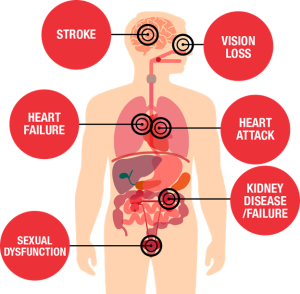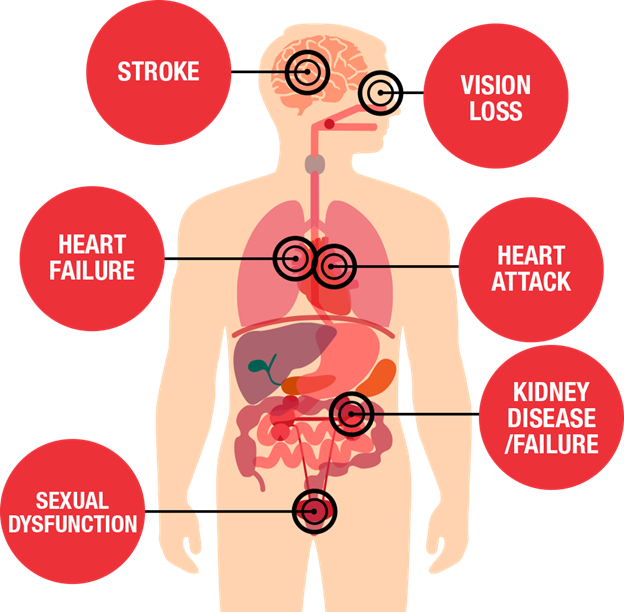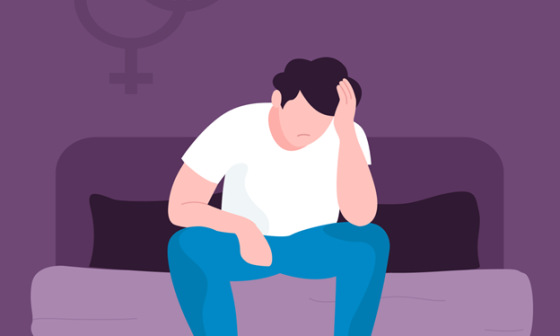Introduction
High blood pressure, or hypertension, is a chronic medical condition that is sometimes referred to as the “silent killer” because, although it rarely exhibits symptoms, neglect and non-compliance to treatment can result in potentially fatal consequences. Hypertension is a major cause of cardiovascular disorders that affects over 100 million Africans, including a sizable section of the Nigerian populace. Damage to blood arteries caused by this silent killer can result in heart disease, stroke, kidney failure, and other consequences.

Source: American Heart Association
Knowing the risks associated with untreated hypertension highlights the necessity for affordable health insurance coverage by Wellahealth for companies and families that support preventative healthcare and provide coverage for regular tests and treatment of hypertension and other chronic diseases.
Dangers of Untreated High Blood Pressure
Blood pressure is the force of blood against the walls of vessels during flow. It is measured using two numbers arranged in numerator and denominator: systolic (the top number, which measures the pressure when the heart beats) and diastolic (the bottom number, which measures the pressure when the heart rests between beats). A normal blood pressure reading is around 120/80 mmHg.
Hypertension is a condition where the force of blood against the walls of the arteries is consistently too high. Hypertension is diagnosed when blood pressure consistently exceeds 140/90 mmHg as measured by a sphygmomanometer. Uncontrolled hypertension can have deadly consequences if it affects too many body organs and cause serious complications. The following are a few of the most typical and untoward risks:
- Heart Failure and Heart Disease
In a hypertensive state, the heart has a tremendous amount of strain because hypertension makes it harder to pump blood. This can eventually result in cardiac disease, raising the risk of arrhythmias, heart failure, and heart attacks. Additionally, the heart muscle may enlarge to become more efficient, however, the heart becomes less effective, and finally fails, resulting in symptoms including exhaustion, breathlessness, and retention of fluid.
- Stroke
Elevated blood pressure increases the risk of hemorrhagic stroke by damaging brain blood vessels. When a portion of the brain’s blood supply is cut off, brain cells die and a stroke happens. One of the biggest risk factors for both hemorrhagic strokes (caused by brain hemorrhage) and ischaemic strokes (caused by blood clots) is untreated hypertension. Complications that arise from a stroke are; long-term impairment, speech problems, and paralysis.
- Kidney Damage
The kidney’s main function is to filter the blood and remove waste products, which can only be performed optimally when the arteries are healthy. Untreated hypertension/long-standing hypertension can cause irreparable damage to the renal arteries predisposing an individual to Chronic Kidney Disease (CKD) and decreased kidney function. can result from hypertension’s damage to the kidneys’ arteries. Untreated hypertension can cause renal failure in extreme situations, necessitating dialysis or kidney transplantation for survival.
- Loss of Vision
Hypertension raises the possibility of developing glaucoma macular degeneration, and hypertensive retinopathy. Hypertensive retinopathy is a disorder caused by high blood pressure that damages the eyes’ tiny, delicate blood vessels. Consequently, if treatment is not received, this illness may result in blindness.
- Mental and Cognitive Decline
The American Heart Association has reported through research that elevated blood pressure is a well-established risk factor for age-related cognitive decline. Furthermore, research has shown that chronic hypertension may be a factor in cognitive loss that results in diseases like Alzheimer’s disease and vascular dementia. The injury to blood arteries in the brain can limit blood flow, impacting memory and cognitive function. The chance of acquiring these disorders rises with time if untreated hypertension is present, especially in older persons.
Steps for Managing Hypertension
- Frequent and consistent checks: Routine blood pressure tests are crucial, especially for persons over the age of 40 or those with risk factors like obesity, diabetes, or a family history of hypertension.
- Lifestyle change: The management of blood pressure is largely dependent on diet and activity, therefore, lifestyle modification is an important factor in hypertension management. Several scientifically proven strategies to control hypertension, include limiting salt intake, eating a nutritious, fruit- and vegetable-rich diet, keeping a healthy weight, and exercising frequently.
- Stress reduction and management: Prolonged stress has been linked to elevated blood pressure. Acquiring stress-reduction skills through frequent relaxation exercises, or mindfulness can help reduce the risk of hypertension.
- Medication: A change in lifestyle and stress elimination alone could not be sufficient for lots of people. Antihypertensive drugs are prescribed by doctors to assist reduce blood pressure. It’s critical to take these drugs as directed by your doctor and to keep your scheduled follow-up appointments.
The Need For Prompt Detection and Treatment
Hypertension frequently exhibits no symptoms, most people may not even be aware of their condition until serious issues arise. Nonetheless, the hazards can be greatly decreased with early detection and treatment. The benefits of prompt diagnosis and early management include:
- Prevention of complications: Serious problems like heart disease, stroke, and kidney failure can be avoided with prompt blood pressure treatment. The chance of irreversible harm to important organs increases with the length of time uncontrolled hypertension persists.
- Financial prudence: Preventing complications like heart attacks and strokes is significantly less expensive when hypertension is treated early. Getting accessible and affordable healthcare coverage from WellaHealth Technologies that ensures and promotes regular check-ups and screenings can help cut down costs on long-term medical expenses related to chronic illnesses like hypertension.
- Improved quality of life: If untreated, hypertension can significantly lower a person’s quality and length of life. By treating it, you can avoid people can live longer, healthier lives and avoid the onset of crippling symptoms and debilitating complications.
Significant life-threatening complications are associated with untreated hypertension, however, these risks can be avoided. By encouraging routine blood pressure checks and providing coverage for hypertension medication, WellaHealth Technologies plays a critical role in promoting preventive care.
Early identification lowers the financial cost of treating the serious problems linked to uncontrolled high blood pressure in addition to saving lives. WellaHealth is aware of the dangerous effects of high blood pressure. For as low as 800/month, WellaHealth’s affordable and all-inclusive health insurance plans provide complete coverage for the management of hypertension, including prescription drugs, doctor visits, and diagnostic exams. Intending to give you and your family access to the treatments required to live longer, healthier lives through comprehensive health coverage.
To subscribe to our plans, contact WellaHealth Technologies today!






